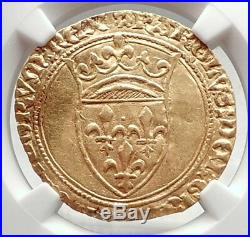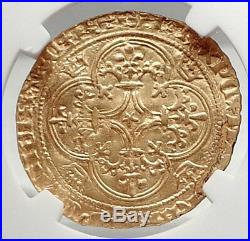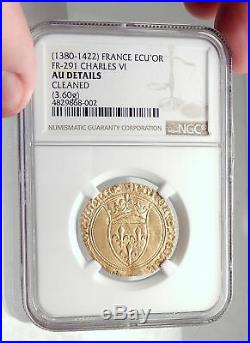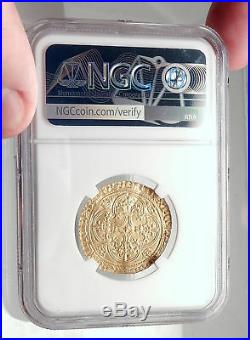





Item: i72723 Authentic Coin of. Royal Charles VI le Bien-Aimé/le Fol (the Well-Beloved/the Mad). Gold Ecu d’Or à la Couronne 26mm (3.60 grams) Saint-Lô mint Refernece; Fr-291, Dup-369D Certification: NGC. AU DETAILS 4829868-002 + KAROLVS DI GRACIA FRANCORVM RX, crowned coat-of-arms of France. + XPC: VICIT XPC RGAT XPC IPRAT, cross fleurée, with a star in the center; all within quatrefoil, with inward-facing lis in angles and crowns in arches. Charles VI (3 December 1368 – 21 October 1422), called the Beloved (French: le Bien-Aimé) and the Mad (French: le Fol or le Fou), was King of France for 42 years from 1380 to his death in 1422. He was a member of the House of Valois. Charles VI was only 11 when he inherited the throne in the midst of the Hundred Years’ War. The government was entrusted to his four uncles: Philip the Bold, Duke of Burgundy; John, Duke of Berry; Louis I, Duke of Anjou; and Louis II, Duke of Bourbon. Although the royal age of majority was fixed at 14, the dukes maintained their grip on Charles until he took power at the age of 21. During the rule of his uncles, the financial resources of the kingdom, painstakingly built up by his father, Charles V, were squandered for the personal profit of the dukes, whose interests were frequently divergent or even opposed. In 1388 Charles VI dismissed his uncles and brought back to power his father’s former advisers, known as the Marmousets. Political and economic conditions in the kingdom improved significantly, and Charles earned the epithet “the Beloved”. But in August 1392 en route to Brittany with his army in the forest of Le Mans, Charles suddenly went mad and slew four knights and almost killed his brother, Louis of Orléans. From then on, Charles’ bouts of insanity became more frequent and of longer duration. During these attacks, he had delusions, believing he was made of glass or denying he had a wife and children. He could also attack servants or run until exhaustion, wailing that he was threatened by his enemies. Between crises, there were intervals of months during which Charles was relatively sane. However, unable to concentrate or make decisions, political power was taken away from him by prominent French nobles who were also his close relatives (the princes of the blood), whose rivalries and disputes would cause much chaos and conflict in France. A fierce struggle for power developed between the king’s brother (Louis I of Orléans) and cousin (John the Fearless, Duke of Burgundy since his father Philip’s death in 1404). When John instigated the murder of Louis in November 1407, the conflict degenerated into a civil war between the Armagnacs (supporters of the House of Valois) and the Burgundians. After the assassination of John the Fearless, his son Philip the Good led Charles (now “the Mad”) to sign the infamous Treaty of Troyes (1420), which disinherited his offspring and recognized Henry V as his legitimate successor on the throne of France. When Charles VI died, the succession was claimed by his son Charles VII, who found the Valois cause in a desperate situation. France , officially the French Republic (French: République française), is a sovereign state comprising territory in western Europe and several overseas regions and territories. The European part of France, called Metropolitan France, extends from the Mediterranean Sea to the English Channel and the North Sea, and from the Rhine to the Atlantic Ocean. France spans 640,679 square kilometres (247,368 sq mi) and has a total population of 67 million. It is a unitary semi-presidential republic with the capital in Paris, the country’s largest city and main cultural and commercial centre. The Constitution of France establishes the state as secular and democratic, with its sovereignty derived from the people. During the Iron Age, what is now Metropolitan France was inhabited by the Gauls, a Celtic people. The Gauls were conquered in 51 BC by the Roman Empire, which held Gaul until 486. The Gallo-Romans faced raids and migration from the Germanic Franks, who dominated the region for hundreds of years, eventually creating the medieval Kingdom of France. France emerged as a major European power in the Late Middle Ages, with its victory in the Hundred Years’ War (1337 to 1453) strengthening French state-building and paving the way for a future centralized absolute monarchy. During the Renaissance, France experienced a vast cultural development and established the beginning of a global colonial empire. The 16th century was dominated by religious civil wars between Catholics and Protestants (Huguenots). France became Europe’s dominant cultural, political, and military power under Louis XIV. French philosophers played a key role in the Age of Enlightenment during the 18th century. In 1778, France became the first and the main ally of the new United States in the American Revolutionary War. In the late 18th century, the absolute monarchy was overthrown in the French Revolution. Among its legacies was the Declaration of the Rights of Man and of the Citizen , one of the earliest documents on human rights, which expresses the nation’s ideals to this day. France became one of modern history’s earliest republics until Napoleon took power and launched the First French Empire in 1804. Fighting against a complex set of coalitions during the Napoleonic Wars, he dominated European affairs for over a decade and had a long-lasting impact on Western culture. Following the collapse of the Empire, France endured a tumultuous succession of governments: the monarchy was restored, it was replaced in 1830 by a constitutional monarchy, then briefly by a Second Republic, and then by a Second Empire, until a more lasting French Third Republic was established in 1870. By the 1905 law, France adopted a strict form of secularism, called laïcité , which has become an important federative principle in the modern French society. France reached its territorial height during the 19th and early 20th centuries, when it ultimately possessed the second-largest colonial empire in the world. In World War I, France was one of the main winners as part of the Triple Entente alliance fighting against the Central Powers. France was also one of the Allied Powers in World War II, but came under occupation by the Axis Powers in 1940. Following liberation in 1944, a Fourth Republic was established and later dissolved in the course of the Algerian War. The Fifth Republic, led by Charles de Gaulle, was formed in 1958 and remains to this day. Following World War II, most of the empire became decolonized. Throughout its long history, France has been a leading global center of culture, making significant contributions to art, science, and philosophy. It hosts Europe’s third-largest number of cultural UNESCO World Heritage Sites (after Italy and Spain) and receives around 83 million foreign tourists annually, the most of any country in the world. France remains a great power with significant cultural, economic, military, and political influence. It is a developed country with the world’s sixth-largest economy by nominal GDP and eight-largest by purchasing power parity. According to Credit Suisse , France is the fourth wealthiest nation in the world in terms of aggregate household wealth. It also possesses the world’s second-largest exclusive economic zone (EEZ), covering 11,035,000 square kilometres (4,261,000 sq mi). French citizens enjoy a high standard of living, and the country performs well in international rankings of education, health care, life expectancy, civil liberties, and human development. France is a founding member of the United Nations, where it serves as one of the five permanent members of the UN Security Council. It is a member of the Group of 7, North Atlantic Treaty Organization (NATO), Organisation for Economic Co-operation and Development (OECD), the World Trade Organization (WTO), and La Francophonie. France is a founding and leading member state of the European Union (EU). World-renowned expert numismatist, enthusiast, author and dealer in authentic ancient Greek, ancient Roman, ancient Byzantine, world coins & more. Ilya Zlobin is an independent individual who has a passion for coin collecting, research and understanding the importance of the historical context and significance all coins and objects represent. Send me a message about this and I can update your invoice should you want this method. Getting your order to you, quickly and securely is a top priority and is taken seriously here. Great care is taken in packaging and mailing every item securely and quickly. What is a certificate of authenticity and what guarantees do you give that the item is authentic? You will be very happy with what you get with the COA; a professional presentation of the coin, with all of the relevant information and a picture of the coin you saw in the listing. Additionally, the coin is inside it’s own protective coin flip (holder), with a 2×2 inch description of the coin matching the individual number on the COA. Whether your goal is to collect or give the item as a gift, coins presented like this could be more prized and valued higher than items that were not given such care and attention to. When should I leave feedback? Please don’t leave any negative feedbacks, as it happens sometimes that people rush to leave feedback before letting sufficient time for their order to arrive. The matter of fact is that any issues can be resolved, as reputation is most important to me. My goal is to provide superior products and quality of service. How and where do I learn more about collecting ancient coins? Visit the Guide on How to Use My Store. For on an overview about using my store, with additional information and links to all other parts of my store which may include educational information on topics you are looking for. The item “1380AD FRANCE Antique Medieval Gold French Coin of King CHARLES VI NGC i72723″ is in sale since Tuesday, October 9, 2018. This item is in the category “Coins & Paper Money\Coins\ World\Europe\France”. The seller is “highrating_lowprice” and is located in Rego Park, New York. This item can be shipped worldwide.
- Country/Region of Manufacture: France
- Composition: Gold
- Certification: NGC
- Year: 1380
- Certification Number: 4829868-002
- Grade: AU DETAILS

